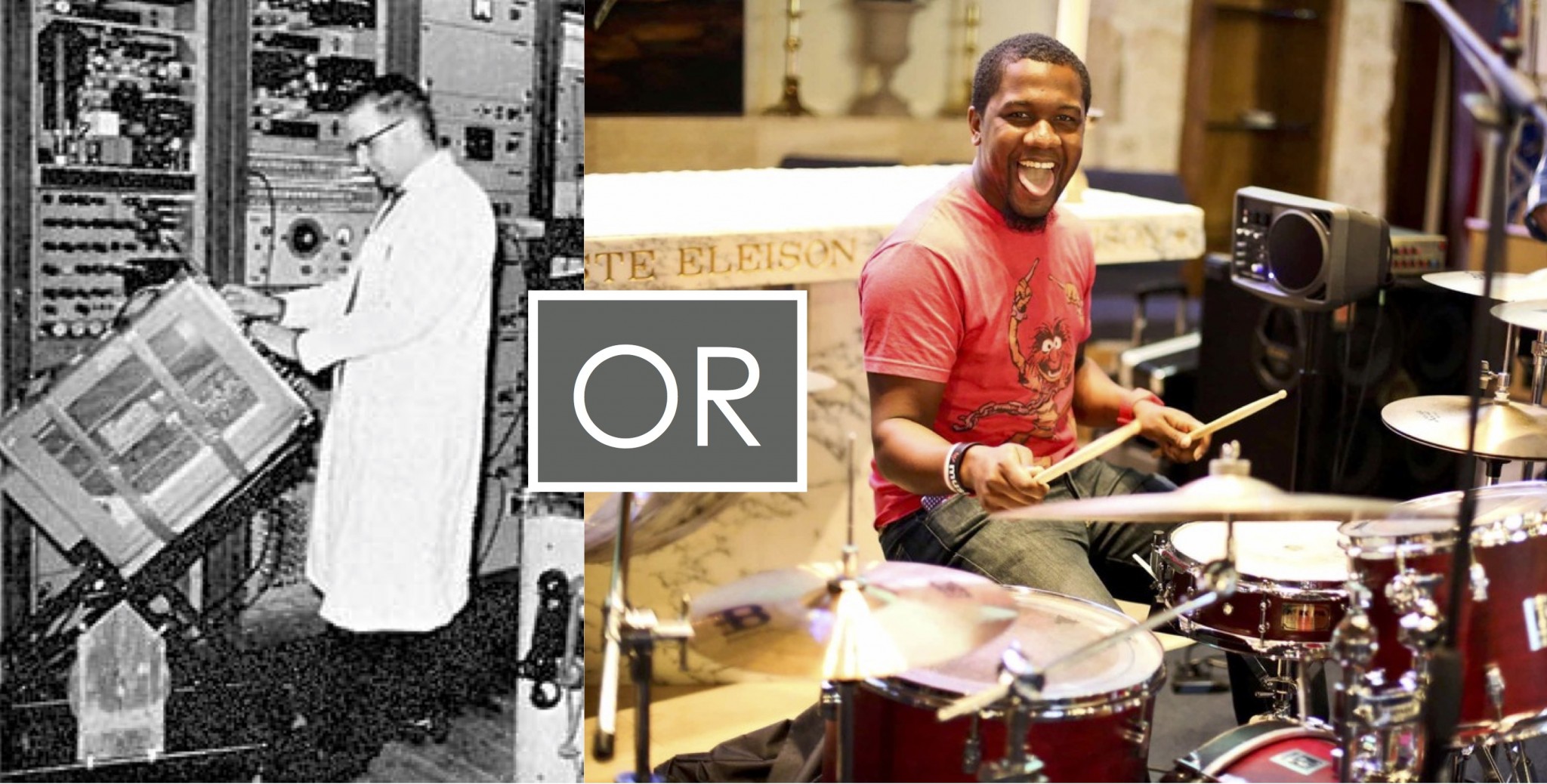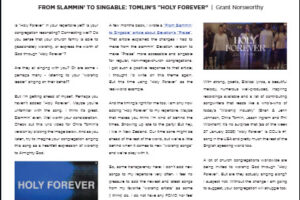Take this link to read Grant’s article as featured in the March issue of Worship…

VOLUNTEER RECRUITMENT: AUDIO TECH? (LOOK TO A DRUMMER)
By Grant Norsworthy
Volunteer Church audio engineers are made, not found.
Need one? Searching for a ready-made volunteer audio engineer will not produce results. Experienced, capable audio techs sitting in the congregation wanting to volunteer their time and energy (for free!) are as rare as idiomatic hen’s teeth.
So, what sorts of raw materials should we be searching for in a person who might be made into a capable audio tech? What type of person will have the best likelihood of developing into a great sound engineer?
You might feel that willingness and a warm body are the only essential prerequisites. Someone – anyone(!) who is willing to drop themselves behind the mixing console will do. I get it.
On the other end of the spectrum, I’ve seen quite extensive lists produced by team leaders for larger churches that describe all the essential qualifying skills that any prospective audio tech volunteer must possess. Invariably these include high tech, geek-attracting requirements like, “Knowledge of or willingness and ability to learn digital mixing consoles (specifically the Superdesk XYZ- 1234), personal mixing system (ABC- 5678), computers, software, outboard racks, microphones …” and so on.
Certainly, a prospective volunteer should be a sincere follower of Jesus and have the willingness to serve. But beyond that, the tendency seems to be to find someone who has an existing affinity for technology.
But maybe the best audio tech volunteer is actually in the band, showing no natural tech geekiness at all. Especially if you are in the enviable situation of being several players deep in any band position, consider approaching a musician to enter the training to become your new audio tech!
I believe that it’s musicians who make the best audio engineers – especially for live music. I’d prefer to have a musical, artistic person – even if they are somewhat technically challenged – than a tech-head, boffin who doesn’t like music behind the mixing console any day of the week – especially Sunday.
And in my many years of involvement with live music, it’s been my experience that drummers often make great audio engineers. Yep! Drummers. And I’m not a drummer! My history is as a bassist and vocalist and, in recent years, playing acoustic guitar.
Drummers? Really? Why?
My theory: The abilities and skills of a great drummer match many of the abilities and skills of a great audio engineer. Here’s what I mean …
1) Technical Creativity
Great drummers have the right balance of left and right brain – of technicality and creativity. Playing drums is very much about precise mathematics, subdivisions of time and tempo. But playing drums is also creative, expressive and about passion and sensitivity. Like great drumming, great mixing requires both tech savvy and musicality.
2) Frequency Range
Great drummers have an innate understanding of the full range of frequencies in sound and the effect that each has on the listener. They know that the high frequency splashes and crashes of cymbal communicate excitement. That the mid-frequency snap of the snare and the thud of toms drive a song forwards. But they also know that the real power to move listeners is found with the correct use of the low frequencies produced by the kick drum. There is no other single instrument or voice on the platform that influences the full frequency spectrum like a drum kit … unless you’re still utilizing a pipe organ. Like great drummers, great sound engineers also understand sound frequencies.
3) Pan
Drummers sit in a position where they are surrounded – left, front and right – by their instrument and the sound of their instrument. Playing acoustic drums gives a constant demonstration of the importance of stereo panning – the left to right panorama of sound. The sound that’s entering the drummers left ear is different from the sound entering the right. And that’s the way it should be! Great audio engineers also know how to utilize panning to great effect in live music mixing.
NOTE: In the unfortunate circumstance where a drummer is forced to play an electronic kit, their appreciation of panning may be stunted. Monitoring of the full drum kit through a mono speaker wedge or headphones kills the stereo image.
4) Volume
Great drummers also understand the importance of dynamic control. Of when loud is good and when it’s bad. Of how to choose the right volume level for each situation, song and moment. Great drummers and great sound engineers understand well how the rise and fall in volume is key to a great musical experience.
NOTE: In the unfortunate circumstance where a drummer is playing an electronic kit or an acoustic kit behind a sound shield or in a fully-enclosed booth, their appreciation for, and level of control of dynamics will be seriously inhibited.
5) Space
Great drummers don’t feel the need to fill every sonic gap. They know the importance of leaving space in sound. Of how less is almost always more. Both great drummers and great sound engineers in the church service setting recognize that the congregation needs to be invited into the sonic “hole” that has been left for them to sing into.
6) Music Lover
Musicians – and that includes drummers (I will NOT be inserting any drummer jokes here) – don’t only play music. They also listen to music. And they LOVE listening! Just about everyone hears music, but there’s a deeper level of appreciation and analysis of music and sound that not everyone enjoys. Great drummers and great sound audio engineers will listen to excellent, recorded examples of music – especially the genre and style of music that they strive to emulate in the church service – and have an understanding of the sonic elements that give them a great listening experience … and what doesn’t.
So maybe you don’t have a great drummer to spare. But the principal still stands. A person who has some musical, creative inclination may have the makings for a better audio engineer than the computer wiz who enjoys technology.
This article was first published by Worship Tech Director of the WFX Network on March 17, 2017.


